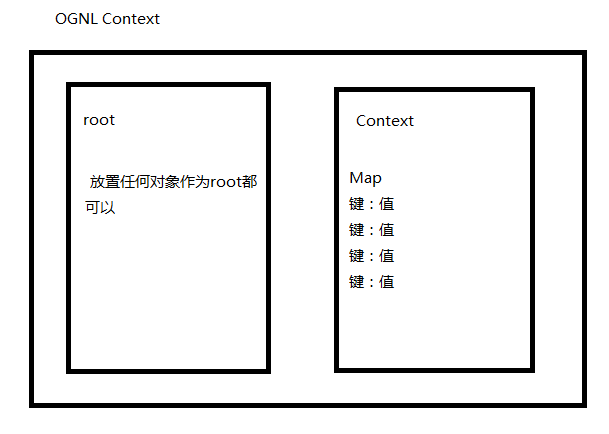OGNL表达式
OGNL:对象视图导航语言. ${user.addr.name} 这种写法就叫对象视图导航.
OGNL不仅仅可以视图导航.支持比EL表达式更加丰富的功能.
代码流程:
1.OGNL不需要导入额外的jar包,因为struts2中包含了

代码基本框架:
@Test //准备工作 public void fun1() throws Exception{ //准备ONGLContext //准备Root User rootUser = new User("汤姆猫",18); //准备Context Map<String,User> context = new HashMap<String,User>(); context.put("user1", new User("阿猫",18)); context.put("user2", new User("阿狗",22)); OgnlContext oc = new OgnlContext(); //将rootUser作为root部分 oc.setRoot(rootUser); //将context这个Map作为Context部分 oc.setValues(context); //书写OGNL Ognl.getValue("", oc, oc.getRoot()); }
语法:
1.基本取值
@Test //取出root中的属性值 public void fun2() throws Exception{ //准备ONGLContext //准备Root User rootUser = new User("tom",18); //准备Context Map<String,User> context = new HashMap<String,User>(); context.put("user1", new User("jack",18)); context.put("user2", new User("rose",22)); OgnlContext oc = new OgnlContext(); oc.setRoot(rootUser); oc.setValues(context); //书写OGNL //取出root中user对象的name属性 String name = (String) Ognl.getValue("name", oc, oc.getRoot()); Integer age = (Integer) Ognl.getValue("age", oc, oc.getRoot()); System.out.println(name); System.out.println(age); }
@Test //取出context中的属性值 public void fun3() throws Exception{ //准备ONGLContext //准备Root User rootUser = new User("tom",18); //准备Context Map<String,User> context = new HashMap<String,User>(); context.put("user1", new User("jack",18)); context.put("user2", new User("rose",22)); OgnlContext oc = new OgnlContext(); oc.setRoot(rootUser); oc.setValues(context); //书写OGNL //取出context中键为user1对象的name属性 String name = (String) Ognl.getValue("#user1.name", oc, oc.getRoot()); String name2 = (String) Ognl.getValue("#user2.name", oc, oc.getRoot()); Integer age = (Integer) Ognl.getValue("#user2.age", oc, oc.getRoot()); System.out.println(name); System.out.println(name2); System.out.println(age); }
2.赋值
@Test //为属性赋值 public void fun4() throws Exception{ //准备ONGLContext //准备Root User rootUser = new User("tom",18); //准备Context Map<String,User> context = new HashMap<String,User>(); context.put("user1", new User("jack",18)); context.put("user2", new User("rose",22)); OgnlContext oc = new OgnlContext(); oc.setRoot(rootUser); oc.setValues(context); //书写OGNL //将root中的user对象的name属性赋值 Ognl.getValue("name='jerry'", oc, oc.getRoot()); String name = (String) Ognl.getValue("name", oc, oc.getRoot()); String name2 = (String) Ognl.getValue("#user1.name='小明',#user1.name", oc, oc.getRoot()); System.out.println(name); System.out.println(name2); }
3.调用方法
@Test //调用方法 public void fun5() throws Exception{ //准备ONGLContext //准备Root User rootUser = new User("tom",18); //准备Context Map<String,User> context = new HashMap<String,User>(); context.put("user1", new User("jack",18)); context.put("user2", new User("rose",22)); OgnlContext oc = new OgnlContext(); oc.setRoot(rootUser); oc.setValues(context); //书写OGNL //调用root中user对象的setName方法 Ognl.getValue("setName('lilei')", oc, oc.getRoot()); String name = (String) Ognl.getValue("getName()", oc, oc.getRoot()); String name2 = (String) Ognl.getValue("#user1.setName('lucy'),#user1.getName()", oc, oc.getRoot()); System.out.println(name); System.out.println(name2); }
4.调用静态方法
public class HahaUtils { //回音方法 public static Object echo(Object o){ return o; } }
@Test //调用静态方法 public void fun6() throws Exception{ //准备ONGLContext //准备Root User rootUser = new User("tom",18); //准备Context Map<String,User> context = new HashMap<String,User>(); context.put("user1", new User("jack",18)); context.put("user2", new User("rose",22)); OgnlContext oc = new OgnlContext(); oc.setRoot(rootUser); oc.setValues(context); //书写OGNL String name = (String) Ognl.getValue("@cn.itheima.a_ognl.HahaUtils@echo('hello 强勇!')", oc, oc.getRoot()); //Double pi = (Double) Ognl.getValue("@java.lang.Math@PI", oc, oc.getRoot()); Double pi = (Double) Ognl.getValue("@@PI", oc, oc.getRoot()); System.out.println(name); System.out.println(pi); }
5.创建对象(List,Map)
@Test //ognl创建对象-list|map public void fun7() throws Exception{ //准备ONGLContext //准备Root User rootUser = new User("tom",18); //准备Context Map<String,User> context = new HashMap<String,User>(); context.put("user1", new User("jack",18)); context.put("user2", new User("rose",22)); OgnlContext oc = new OgnlContext(); oc.setRoot(rootUser); oc.setValues(context); //书写OGNL //创建list对象 Integer size = (Integer) Ognl.getValue("{'tom','jerry','jack','rose'}.size()", oc, oc.getRoot()); String name = (String) Ognl.getValue("{'tom','jerry','jack','rose'}[0]", oc, oc.getRoot()); String name2 = (String) Ognl.getValue("{'tom','jerry','jack','rose'}.get(1)", oc, oc.getRoot()); /*System.out.println(size); System.out.println(name); System.out.println(name2);*/ //创建Map对象 Integer size2 = (Integer) Ognl.getValue("#{'name':'tom','age':18}.size()", oc, oc.getRoot()); String name3 = (String) Ognl.getValue("#{'name':'tom','age':18}['name']", oc, oc.getRoot()); Integer age = (Integer) Ognl.getValue("#{'name':'tom','age':18}.get('age')", oc, oc.getRoot()); System.out.println(size2); System.out.println(name3); System.out.println(age); }


